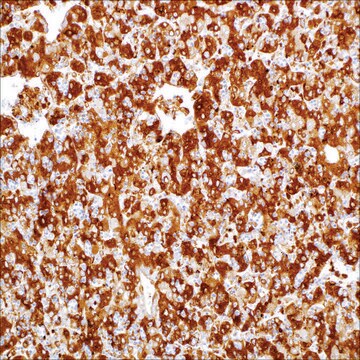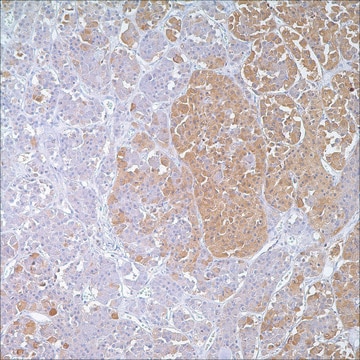Recommended Products
biological source
rabbit
Quality Level
100
500
conjugate
unconjugated
antibody form
Ig fraction of antiserum
antibody product type
primary antibodies
clone
polyclonal
description
For In Vitro Diagnostic Use in Select Regions (See Chart)
form
buffered aqueous solution
species reactivity
human
packaging
vial of 0.1 mL concentrate (223A-14)
vial of 0.5 mL concentrate (223A-15)
bottle of 1.0 mL predilute (223A-17)
vial of 1.0 mL concentrate (223A-16)
bottle of 7.0 mL predilute (223A-18)
manufacturer/tradename
Cell Marque™
technique(s)
immunohistochemistry (formalin-fixed, paraffin-embedded sections): 1:500-1:2000
control
tonsil
shipped in
wet ice
storage temp.
2-8°C
visualization
cytoplasmic
Related Categories
General description
The immunohistochemical staining of Alpha-1-Antitrypsin is considered to be very useful in the study of inherited AAT deficiency, benign and malignant hepatic tumors, and yolk sac carcinomas. Positive staining for A-1-Antitrypsin may also be used in the detection of benign and malignant lesions of a histiocytic nature. The sensitivity and specificity of the results have made this antibody a useful tool in the screening of patients with cryptogenic cirrhosis or other forms of liver disease with portal fibrosis of uncertain etiology.
Quality
 IVD |  IVD |  IVD |  RUO |
Linkage
Physical form
Preparation Note
Other Notes
Legal Information
Not finding the right product?
Try our Product Selector Tool.
Certificates of Analysis (COA)
Search for Certificates of Analysis (COA) by entering the products Lot/Batch Number. Lot and Batch Numbers can be found on a product’s label following the words ‘Lot’ or ‘Batch’.
Already Own This Product?
Find documentation for the products that you have recently purchased in the Document Library.
Our team of scientists has experience in all areas of research including Life Science, Material Science, Chemical Synthesis, Chromatography, Analytical and many others.
Contact Technical Service








